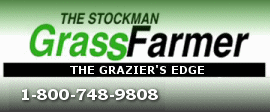The continuing decline in American wool production is creating profitable new opportunities for direct marketers
Staff report
CHURCHVILLE, Virginia: Francis Chester will tell you that these are the worst of times and the best of times for wooled sheep producers.
�Wool production in America has finally gotten so small that it no longer is a viable commodity,� he said.
�Wool is now a niche and that�s wonderful.�
Chester has several hundred fine wool Merinos and Columbias on his 300-acre pastoral farm near Staunton, Virginia, and is planning a major expansion in numbers to over 1000 due to the demand for his wool.
However, rather than selling his wool to Italian mills for less than the cost of shearing as most American producers do today, Chester turns his into high value wool yarn in a small mill in the basement of his 140-year-old barn.
�There are only 11 wool mills left in America and I�m one of them,� he said.
�You can make more money out of wool than meat if you process it.�
In addition to yarn for home hand knitters, he also makes sweaters, hats and scarves, which he sells out of a store in the upstairs of the large red barn that houses his wool-based enterprises.
He said his average retail sale is $100.
�You don�t need a lot of customers each day with that size average sale.�
The small wool mill is in the basement of the barn and can be toured for $3.00.
The farm has 14 employees including several of his children and grandchildren.
Prior to the Civil War, the Shenandoah Valley of Virginia was one of America�s major wool production centers. The surrounding mountains create a rainfall shadow that makes the Valley�s climate more like Kansas than Virginia.
During the Civil War the Valley was called �The Breadbasket of the Confederacy� due to its excellent wheat production.
Lee�s army wore wool jackets made in the Valley where wool milling was a major business. Much of this mill infrastructure was destroyed in the war.
�The Shenandoah Valley is high and dry and ideal for sheep but I�m the last wool mill in the state.�
The Merino and Columbia flocks are run separately and are on different lambing seasons to better utilize the farm�s facilities. All lambs are direct marketed as �fresh frozen.�
The sheep are sheared once a year in the spring by shearers from Wyoming. The wool is shipped to Texas for scouring and then returns for dyeing and manufacturing.
Chester said he was originally from Long Island, New York. As a boy he milked goats and raised free-range laying hens. Both of these products he sold door to door.
In 1950, he bought a small fruit stand adjacent to the new Long Island Expressway and painted it a bright yellow to make it visible.
�I learned early in life that it doesn�t make any difference how good your product is if nobody notices you.�
He said the roadside stand was very lucrative but his father insisted that he go to law school as a �backup� career.
�I hated every minute of law school because I had to wear a coat and tie. I�ve never wanted to be anything but a farmer.�
He started raising sheep on Long Island after graduating from law school.
�Lamb is very lucrative in New York due to the large number of Jews and Italians. I was getting $60 a lamb in the 1960s but the high New York taxes were killing me.
�I�ve always had this dream of a farm with a big red barn surrounded by mountains. I was down here on vacation and saw this farm and knew I had to have it.�
He bought the farm, moved to Staunton in 1968, started a �country� law practice and continued to raise and expand his sheep production.
Seeing the market for his wool continually shrinking he decided to put in his own mill.
�You could buy a used wool mill in New England at the time for pennies on the dollar.�
He brought an unemployed mill worker from Maine south to run the mill.
He decided to specialize in yarn for hand-knitters. Today, the yarn is sold through specialty stores in 40 states and Canada and on the Internet.
The farm�s wool is sold under the Cestari Wool label. Cestari is the original Italian spelling of the family name.
Wool from outside producers with comparable quality is also used.
He sponsors �knit-ins� where people can learn hand knitting and hosts an autumn �Pumpkin Festival� on the farm that attracts over 6000 people.
�Sheep love to eat pumpkins,� he said.
He also does custom work for other fine wool sheep producers across the country and welcomes visits and inquiries from other wooled sheep producers.
�I think there has been way too much emphasis on bigness. You can be small and profitable as long as you are willing to be different.�
� by The Stockman Grass Farmer
If You Would Like To Read More Articles Like This One, CALL 1-800-748-9808 And Request A Free Sample Of THE STOCKMAN GRASS FARMER TODAY!
Or Order A Free Sample Of THE STOCKMAN GRASS FARMER online. CLICK HERE.
To subscribe to THE STOCKMAN GRASS FARMER CLICK HERE.
Copyright � 2008 Stockmangrassfarmer All rights reserved.
